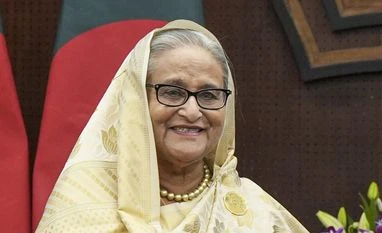Confirming that Bangladesh Prime Minister Sheikh Hasina had resigned on Monday, Bangladesh Army Chief General Waqar-uz-Zaman said that an interim government would run the country, reported Reuters.
According to the news agency, the Bangladesh Army chief also said that there was no need for a curfew or any emergency in the country, adding that a solution to the crisis would be found by tonight.
The Army chief also said that representatives from Bangladesh's main political parties were present in discussion with the Army, according to Reuters. He also requested the protesting students to stay calm and go back home.
Having ruled since 2009, Hasina secured a fourth consecutive term in January. However, the elections were boycotted by the main Opposition, the Bangladesh Nationalist Party. Hasina has been accused of suppressing dissent and entrenching power through state institutions.
How is India reacting to Sheikh Hasina's resignation
Former foreign secretary Harsh Vardhan Shringla on Monday said that an unstable Bangladesh could add to instability in parts of India, adding that Indian interlocutors would be engaged with concerned people in Bangladesh to ensure that our larger interests are protected.
Speaking to news agency ANI, Shringla, who also served as a High Commissioner to Bangladesh, emphasised the need to work with all concerned to ensure that both India and Bangladesh's interests are secured.
"An unstable Bangladesh can add to instability in parts of our country, which we do not want to see. So, a peaceful, prosperous, stable Bangladesh is (in) India's best (interest)," Shringla told ANI, adding, "It is very important that we work with all concerned to ensure that our interests and those of Bangladesh are secured."
More From This Section
Shringla aslo stressed that it was in India's interest to ensure that there is peace and stability in its neighbouring countries.
According to ANI, keeping in mind the law and order situation in Bangladesh, the Border Security Force (BSF) on Monday issued a high alert along the India-Bangladesh border. Additionally, a senior BSF officer told the news agency that the BSF DG had also reached Kolkata.
Earlier in the day, commenting on reports of Sheikh Hasina leaving her official residence in Dhaka, Pinak Ranjan Chakravarty, former Indian High Commissioner to Bangladesh, told ANI: "This pressure and the demonstrations were mounting. Clearly, the government there was under pressure. The Army, which is a powerful institution in that country, must have stepped in some way, if it is true that she has resigned, and told her that things are bad...".
Chakravarty said that this is "a major event in Bangladesh", adding that "we will see a new kind of government there".
The former Indian High Commissioner to Bangladesh warned that India can look forward to a "period of instability", which is bad for Bangladesh. He added, "It is also not good for the region. India will be watching what is going to happen."
What made Sheikh Hasina resign?
Bangladesh Prime Minister Sheikh Hasina resigned on Monday after violent protests rocked the country over the weekend.
According to BBC News, thousands of protesters on Monday also stormed Sheikh Hasina's official residence in the capital Dhaka.
Citing Bangladesh media reports, ANI reported that Sheikh Hasina had departed from Bangabhaban for a "safer place" at around 2:30 pm on Monday on a military helicopter. According to the report, she was accompanied by her younger sister, Sheikh Rehana. Subsequently, BBC Bangla reported that Hasina's helicopter was heading to the Indian city of Agartala.
Sheikh Hasina's resignation comes after a fresh outbreak of violence in Bangladesh on Monday claimed at least six more lives as thousands of protesters started gathering for a 'Long March to Dhaka', a day after over 100 people died in clashes between demonstrators demanding Sheikh Hasina's resignation and the ruling party's supporters.
Sunday morning's clashes broke out when protesters, under the banner of Students Against Discrimination, attending a non-cooperation programme with the single-point demand of Hasina's resignation faced opposition from supporters of the ruling Awami League, along with Chhatra League and Jubo League activists.
Bengali-language newspaper Prothom Alo reported that at least 101 people, including 14 policemen, were killed in Sunday's clashes. Responding to the violence, authorities cut off mobile internet and enforced a nationwide curfew for an indefinite period.
Sunday's events came days after more than 200 people were killed in violent clashes between police and mostly student protesters demanding an end to a quota system that reserves 30 per cent of government jobs for relatives of veterans of Bangladesh's War of Independence in 1971. Since then, over 11,000 people have been arrested.
The quota system, which was established in 1972, was briefly abolished in 2018, but later reinstated. The protests began late last month. Protesters have argued that this quota system, which has long been a source of contention, is discriminatory. According to them, it unfairly favours supporters of Hasina's Awami League party and limits opportunities that other qualified candidates can avail of. In its place, they have advocated for a merit-based system.
While the protests were initially paused after the Bangladesh Supreme Court scrapped most quotas in the country, they resumed, with protesters demanding justice for those killed. In fact, the deadly protests evolved beyond just the quota issue and into a broader anti-government movement, which drew support from diverse sections of the country's society, including musicians, film stars, and even garment manufacturers.
(With agency input)
)